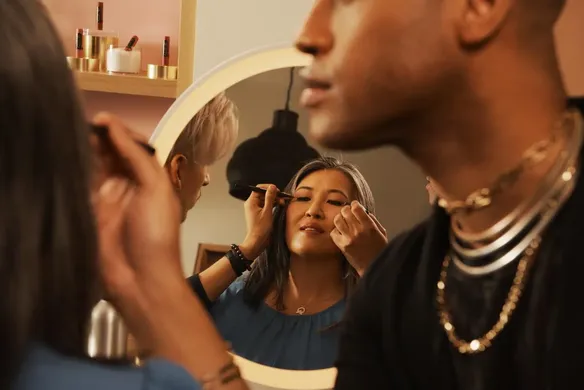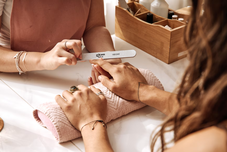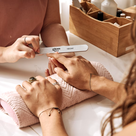Table of contents
How to Start a Skincare Business and Launch Your Own Brand
We all want to stay healthy and while diet, hydration and exercise all play a part, skincare requires diligence, especially in countries like Australia where our skin fights a near-constant battle against sun damage. We need to think about what’s on the outside as well as what’s on the inside, which is why many Australian adults have at least a rudimentary skincare routine.
The beauty industry is projected to see consistent growth. Consumers are growing more discerning in the products they buy. They don’t want to invest in cheap, cheerful and loaded with parabens. They want natural, vegan, cruelty-free, ethically sourced and homemade where possible. This has created a wealth of opportunities for enthusiastic skincare entrepreneurs to develop and market their own products to consumers. But where do you begin? And how can you make your brand stand out in a sea of competitors?
Here you can find out how to start a skincare business and launch a brand that resonates with consumers. We also recently spoke to Fluff about building a skincare brand. Check out our chat here.
Benefits of starting a skincare business
The beauty market is growing exponentially, with skincare products alone driving estimated revenues of over $1,905 million in Australia in 2021. The market is extremely diverse, with consumers looking for alternative product ranges, creating opportunities for new brands to earn their loyalty. Show consumers something that meets their needs and they’re likely to keep using your products and also recommend them to friends, family and colleagues. This provides a reliable model from which to grow your business. What’s more, because the skincare market is gradually shifting towards e-commerce, you don’t have to contend with the overheads that come with running your own physical store, or hand over a chunk of your profits to distributors. You can simply start up your own e-commerce store and sell products directly.
However, before you can start your own skincare business, you need to get to know the market and the tools you need to succeed.
Requirements for starting a skincare line
Before formulating your skincare products and selling them, it’s worth taking some time to understand the requirements for entering this market.
Skills and knowledge
A strong skincare brand starts with a strong product. You need a good understanding of botanicals, how human skin behaves and what nutrients keep it healthy. If you’re thinking of developing products for skin conditions such as acne, eczema or psoriasis, you’ll also need an excellent understanding of these conditions, their causes,triggers, and the ingredients to help combat their symptoms.
Licences and permits
The cosmetics market in Australia is largely self-regulated. You do not need a licence to manufacture cosmetics. Nor is Good Manufacturing Practice (GMP) a mandatory accreditation within the industry. You are not expected to submit your products to any government agency for inspection or approval before bringing them to market. However, there are still come compliance boxes you will need to check:
- Ensure that your manufacturing facilities and equipment are properly sanitised
- Monitor the air and water quality strictly
- Keep all facilities well ventilated, free of dust and properly temperature-controlled
- All chemicals used must be permitted in Australia (check with the National Industrial Chemicals Notification and Assessment Scheme (NICNAS))
- Check all claims, safety and labelling obligations with the Australian Competition and Consumer Commission (ACCC)
- Check whether any ingredients that you plan to use are covered by the poisons standard established by the Therapeutic Goods Administration (TGA)
- Check with IP Australia to ensure that your product does not impinge on any existing copyright or patent
Business registration
To register a business in Australia, you need to:
- Register your company and business name with the Australian Securities and Investments Commission (ASIC)
- Apply for an Australian Business Number (ABN)
- Get your Tax File Number (TFN)
- Register for Goods and Services Tax (GST)
- Register your website domain name
- Open a business bank account
Essential equipment & materials to start a skincare business
One of the great things about the skincare industry is that the barriers to entry are fairly low. You don’t have to spend tens of thousands of dollars on expensive equipment and ingredients to get started. In fact, you can start manufacturing skincare products in your kitchen, (subject to proper inspections.)
The essential equipment and materials are mostly inexpensive and easy to access, including:
- Thermometer (an inexpensive glass lab thermometer will be fine)
- Digital scales that measure to 0.1 of a gram
- Electric stick blender for emulsifying ingredients to create creams and lotions
- Electric whisk to whip body butters
- Measuring jugs and beakers (heat-proof glass lab beakers)
- pH strips to measure the acidity of your products
Identify your target market
What good is an amazing product if nobody knows it exists? The skincare market is huge, and you will be competing with global brands with colossal marketing budgets. Before you can start marketing your product, find your own niche within the market, building your product around your customer’s unique needs. For instance:
- Eco-conscious: Consumers are warier than ever about the number of potentially harmful petrochemicals and parabens lurking in cheaper skincare products. They want natural products with environmentally friendly ingredients.
- Kids and teens: Parents want to make sure that their kids have healthy skin, while teens want to ensure that their skin is able to weather hormonal changes easily.
- Luxury:People want products that carry prestige value and help them to look and feel good. Aim for a high-earning clientele, pack your product with luxurious ingredients and you could have the beginnings of a luxury skincare brand.
- Specialist:Perhaps you want your product range to tackle a specific problem or condition? Prove your product’s worth to consumers within this niche and they’ll sing your praises to others.
Avoid chasing trends. Instead, consider the problems and frustrations that your target audience has with existing skincare products, and present your product as an effective solution for these problems. Earn their loyalty through your quality product.
Choose skincare products
You may have a wealth of ideas for skincare products. When starting out, however, it’s advisable to start with a single ‘hero’ product: the product upon which you build your brand, and expand as your following and consumer base grows.
Present your product as a solution to a prospective customer’s problem or frustration, and differentiate it from similar products. For instance, a hydrating face cream that doesn’t leave the skin feeling oily, cellulite treatment that delivers results naturally, or simply a higher proportion of active ingredients than similarly priced products, effectively offering consumers more for their money.
It’s up to you what market segment to target. Here are some you may wish to choose:
- Facial care products
- Body care products
- Lip care products
- Intimate skincare products
Top 3 trending skincare products
Not sure where to start? Try looking at what consumers are already clamouring for and think about how you will create a unique selling point (USP) (unique selling proposition) that enables you to stand out from the crowd.
1. Hand care products
For obvious reasons, we’re all washing and sanitising our hands more than ever. While this is great for warding off viruses, it can take a toll on our skin, especially when using harsh chemicals and alcohol-based sanitisers. Consumers want hand care products that will help to prevent the spread of viruses while also being kind to the skin.
2. Blue light protection skincare
There are many products on the market to protect skin from UV light.. Nonetheless, blue light can cause hyperpigmentation just as UV light can. A growing range of skincare products is built around protecting those who spend much of their work and leisure time in front of screens from blue light damage.
3. Probiotic skincare
Probiotic skincare products are not new. However, they have gone from strength to strength over the past decade as more consumers have begun to pay attention to the benefits. These products use ’friendly’ bacteria believed to support healthy skin via the skin’s complex microbiome. These products can help to bring balance to the skin, with some considering them the future of skincare.
How to find a supplier
Now you have a product and a target market. You just need to introduce them to one another. A supplier can help you get your products into stores where they will fall into the hands of consumers.
There are numerous ways to find suppliers including:
- attending industry events and trade shows
- searching global directories like Kompass, Global Sources or Sourcify
- asking other skincare brands or industry leaders for referrals and recommendations
There are a number of different types of suppliers out there. Some are manufacturers that produce unique products made to your specification, while others manufacture white label products that you can sell using your own branding.
Keep in mind, of course, that the supplier and the retailer will both take a cut of your profits. However, through them you can reach a much broader audience than by selling directly to the consumer. You can start out doing this in places like makers’ markets and craft fairs with your own POS system so you can take card payments instantly.
Build an online store
If you want to cut out the middleman and eschew suppliers, why not open your own online store? Here you will be able to market your products to audiences and accept fast and secure payments online. Your website can do more than help you to sell products. It can help potential consumers to get to know you better and understand what makes your brand different. You can also use your blog to establish your experience and authority in the realm of skincare, addressing consumers’ problems and concerns, thereby building value and trust in your brand.
Even if you have a relationship with a supplier who puts your products in stores, it’s a good idea to have an online store as well. This multi-channel approach can help you to grow your consumer base while providing choice and convenience for your customers.
The good news is that you don’t need extensive coding knowledge to set up a fully functional online store. Nor do you have to pay a fortune to a web designer to build one for you. At Square, we make it easy and affordable for new businesses to establish their own online stores and accept secure payments from customers.
How to market your business
Now your product and your distribution channels are up and running. But you can’t afford to wait for consumers to come to you. You need a multi-channel marketing approach. The good news is that it no longer costs a fortune to market your product. Here are some low-cost marketing methods that can help the right people to find your skincare range.
Social media
Social media channels are invaluable in helping brands to reach consumers. So it’s worth taking the time to carry out some market research and find out what platforms your target audience uses. For instance, if you’re targeting young professional women in their early twenties, you’re unlikely to find them on Facebook. They’re more likely to be on visually oriented platforms like Instagram, Pinterest or TikTok.
Social proof
A few choice words from a happy customer needn’t cost anything. But they can make a huge difference to new prospects who are researching your brand. Customer reviews are a great form of social proof, so try incentivising your customers to leave you a review by offering them a discount on their next purchase or entering them into a prize draw.
Word of mouth / referrals
Speaking of social proof, no social proof speaks more eloquently than the recommendation of a trusted friend, colleague or family member. Even in the digital age, word of mouth is a powerful marketing tool. Incentivising referrals is an extremely cost-effective way to grow your brand.
Influencer marketing
Millennials and gen Z consumers still value the opinions of social media influencers, and getting them on side can be a great way to expose prospective customers to your brand. Reach out to influencers that matter to your target audience and offer these influencers their own promotional code to give their followers an exclusive discount on your products.
Doing this manually can be a time-consuming process. However, using Square Marketing makes it quick and easy to automate email marketing campaigns in line with your goals and special promotions. Even sending unique promotional codes to customers for special occasions like birthdays and anniversaries is quick and easy.
How Square can help grow your skincare line
Whatever your skincare product range and wherever you choose to sell it, you can trust Square to help you accept customer payments in person and online without hefty charges or lengthy commitments.
Square POS can help you to accept in-person payments wherever you are, while Square Online can help you with every aspect of e-commerce. Bring your products to the people without sacrificing your profit margins. What’s more, Square’s free inventory management suite helps you to keep track of stock levels as demand rises, preventing you from losing sales due to diminished inventory.
![]()











